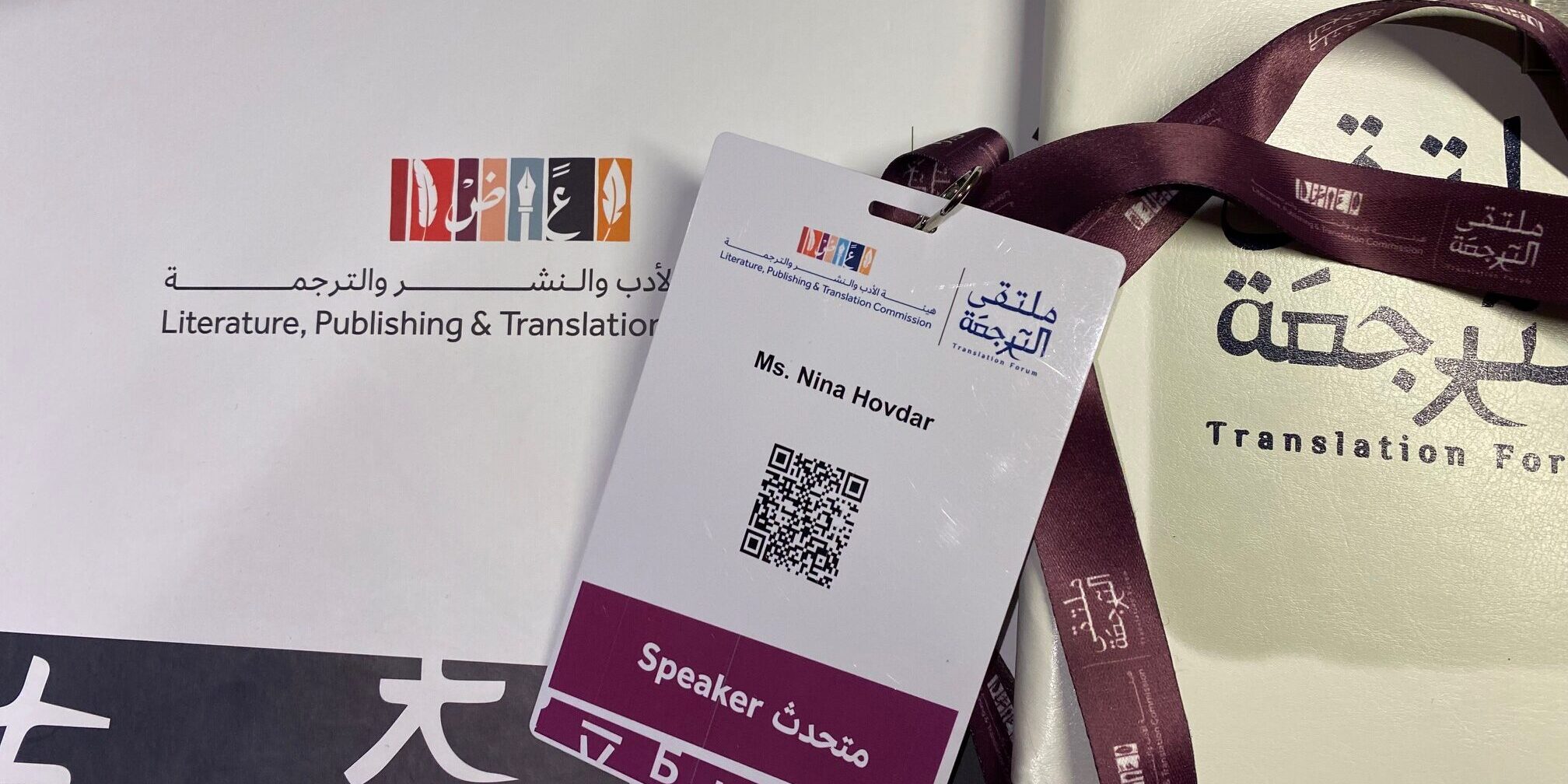How I experienced the Translation Forum 2022 in Saudi Arabia
After a successful first edition in 2021, the Translation Forum 2022, which took place on the 3rd and 4th November in Riyadh, Saudi Arabia, was an event where translation scholars and practitioners from around the world came together to:
- highlight the latest trends and technologies in the translation industry
- shed light on the role of translation in enhancing Saudi Arabia’s cultural presence internationally
- equip the community of translators with recent skills and technical expertise in the translation market
- stimulate competitiveness and enhance work opportunities in the field of translation.
Given these ambitious goals, the program of this 2-day conference was highly varied, ranging from literature translation, video game localization, project management, tourism translation, cinematic translation, artificial intelligence and technology, and of course: transcreation.
Discussions on transcreation
Transcreation was indeed a topic that met with great interest. I therefore had the triple honor to
- run an on-site seminar on “Transcreation for marketing purposes”
- conduct one-on-one conversations with novice translators and PhD candidates in a “Speak to the Experts” session, and
- be a panelist on “Creative translation for advertising and marketing purposes.”
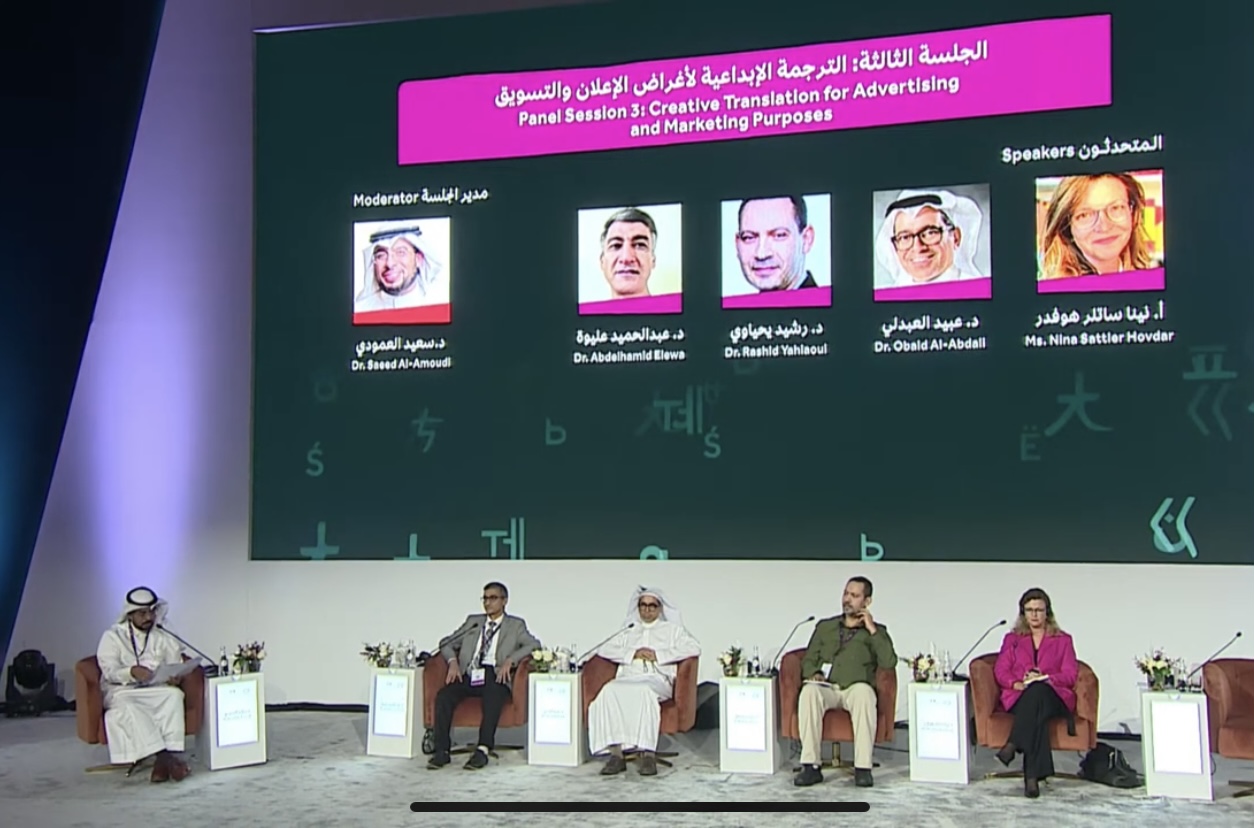
Panel on Creative Translation for Advertising and Marketing Purposes. From left to right: Moderator Dr. Saaed Al-Amoudi. Panelists: Dr. Abdelhamid Elewa, Dr. Obaid Al-Abdali, Dr. Rashid Yahiaoui, and yours truly.
Having been a transcreation practitioner for more than two decades, I am constantly surprised by how often transcreation work is still simply thought of as some kind of “creative translation” (I write about this here) and how it is hardly taught in academic translation courses. And even if transcreation is taught, misconceptions abound.
So, I was very happy about the opportunity to demystify some of those misconceptions in my sessions.
The workshop I ran on the first day of the conference focused on the following key essentials:
- what transcreation really is, and how it works
- how it differs from other language services
- why artificial intelligence will not replace the human expert in this field
- how translators can acquire the skills to become professional transcreators.
As a speaker at the panel on “Creative Translation for Advertising and Marketing Purposes”, which took place on the second conference day, the key points I made were that:
- translation teaching is generally still too stuck on decoding source text nuances rather than focusing on the actual goals the client is aiming for (which can only be found out through conversations with the client)
- in transcreation, we work with target markets, not target languages (with all the implications this has in terms of adaptation)
- transcreation is not about the degree of clever wordplay we use, but about creating texts that are so interesting and relevant for the target group that they take some kind of desired action.
Or, to quote David Ogilvy:
“When I write an advertisement, I don’t want you to tell me that you find it creative. I want you to find it so interesting that you buy the product.”
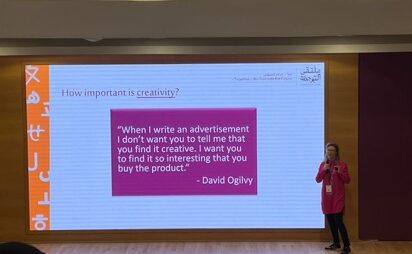
Transcreation is about relevance not just creativity
So much to take in, so much to talk about
As is the case with any professional event of this size – which was followed via live streams by more than 40,000 viewers apparently! – the presentations, workshops and panels were only one aspect where we all learn from one another.
The best part for me were all the one-on-one conversations and discussions in the hallways, exhibition areas and lounges. While many of these were about the rich facets of translation work, I particularly enjoyed the cultural insights that we were able to exchange, and the many new friendships that were made. It was a truly upbeat and remarkably open, stimulating atmosphere.
Vibes of change
It was interesting to see first-hand the changes that are currently happening in Saudi Arabia – and they have just begun. Hosting international speakers (including from outside the Arab world, like me!) is one of the many signs that the country has a clear interest in promoting intercultural understanding.
What are some of the changes? Well for one, I was happy to see that women and men are now attending the same halls and rooms, happily sitting next to each other. Just two years earlier they would have had completely separate halls and events (so I was told).
I learned that, since late 2019, women are no longer required by law to cover their hair and faces. From what I saw, however, most local women still do so when in public, wearing an abaya (long cloak) and niqab (headscarf and veil that are wrapped such that there is only an opening for the eyes), all in black. Some leave their faces uncovered or wear abayas in elegantly matching colors and patterns rather than black all over, yet that was more the exception than the rule. Personally, I had quite a hard time recognizing the many lovely women I met when they greeted me with a cheerful “Hi, Nina!”, when I could only see their eyes. Who was that again? I do like to see people’s faces, their expressions, their smiles, especially when in conversation. Still, I definitely sensed vibes of changes.
Maybe the changes I witnessed are due to the fact that translators tend to be open-minded, more so than the general public. Maybe the translation community is not representative. Maybe my impressions were skewed by what is happening in urban places like Riyadh, as opposed to other, more rural and conservative parts of the country. But the process has to start somewhere, and it will hopefully, eventually, lead to freedom of choices for everyone.
Overall, it was fascinating to see how the old and the new came together in so many ways, both at the event and at venues outside of it, be they restaurants, shops, or new real estate developments. There is a lot of construction going on, and while we (in most of Europe) are starting to downsize shopping malls and buy clothing second-hand, huge and rather exclusive malls are cropping up everywhere in Riyadh. And where we look at ways to reduce emissions and energy consumption whenever we can, my hotel room was always fully lit, air conditioning running, when I got there at night. I switched it off overnight since temperatures in November were really nice.
Traditional shops and restaurants can still be seen everywhere, and are proudly maintained. On our city tour, we were served a delicious lunch of local cuisine at one of them. I love the spices, the textures, everything. I even got to taste camel meat!
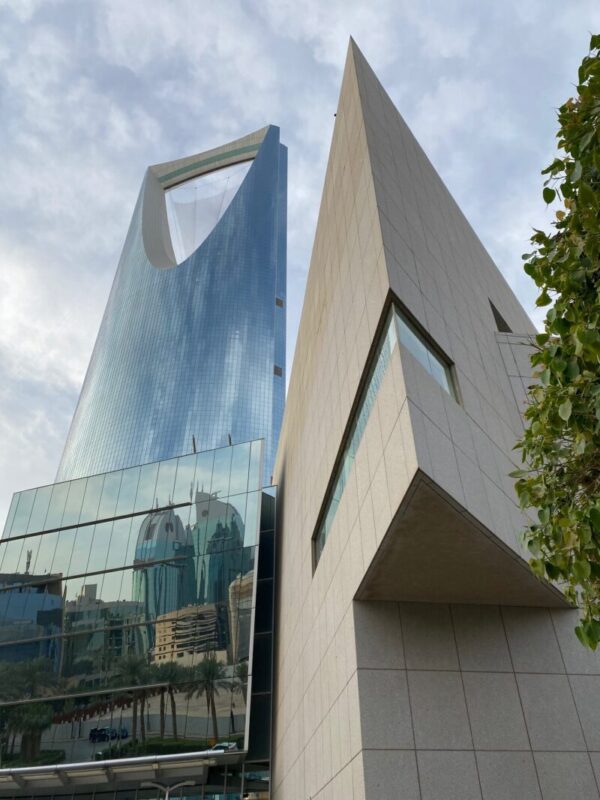
Looking up to the sky bridge on the 99th floor of the Kingdom Tower in Riyadh
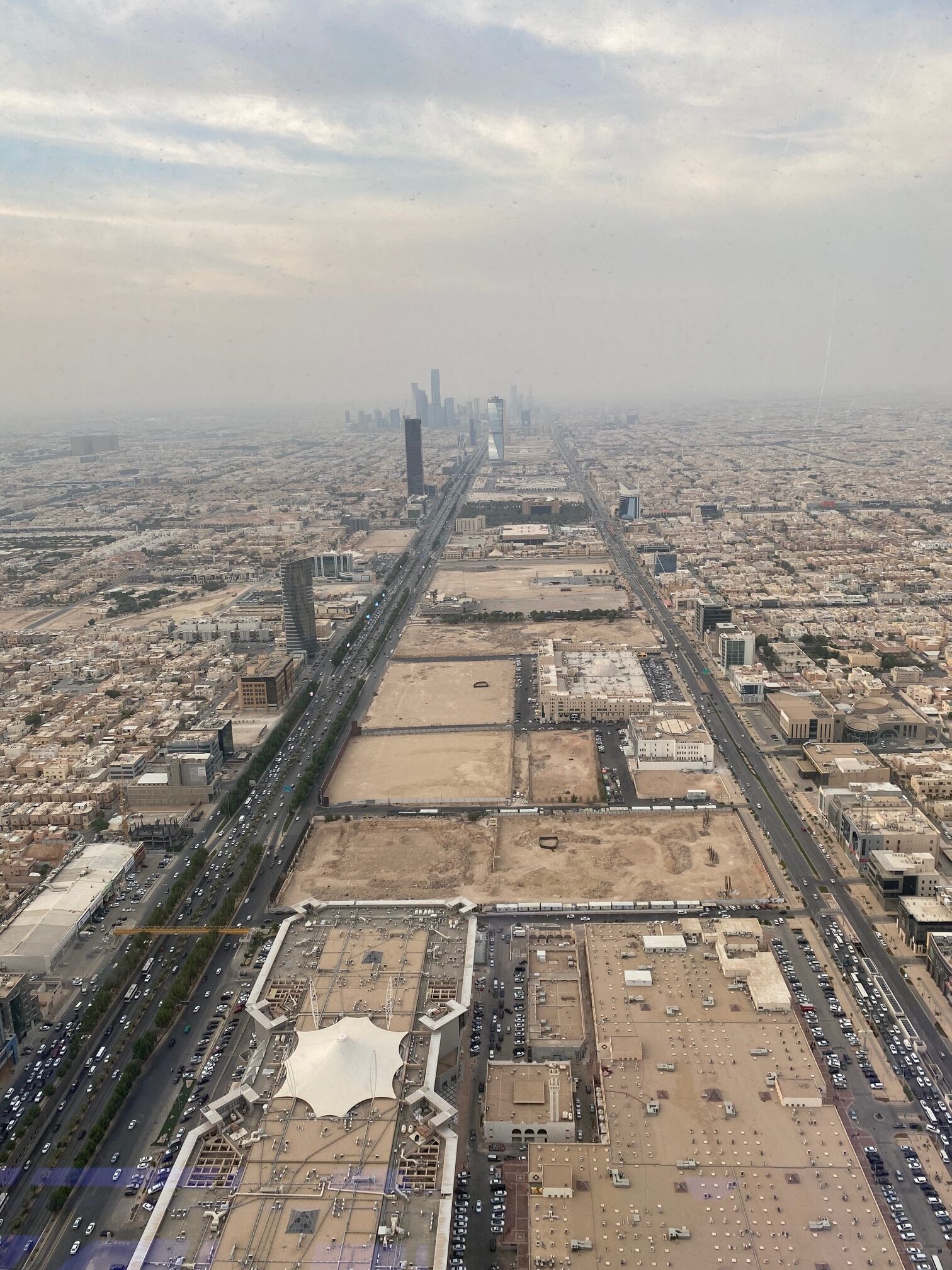
Lots of construction going on in Riyadh. View from the Kingdom Tower toward the Business District.
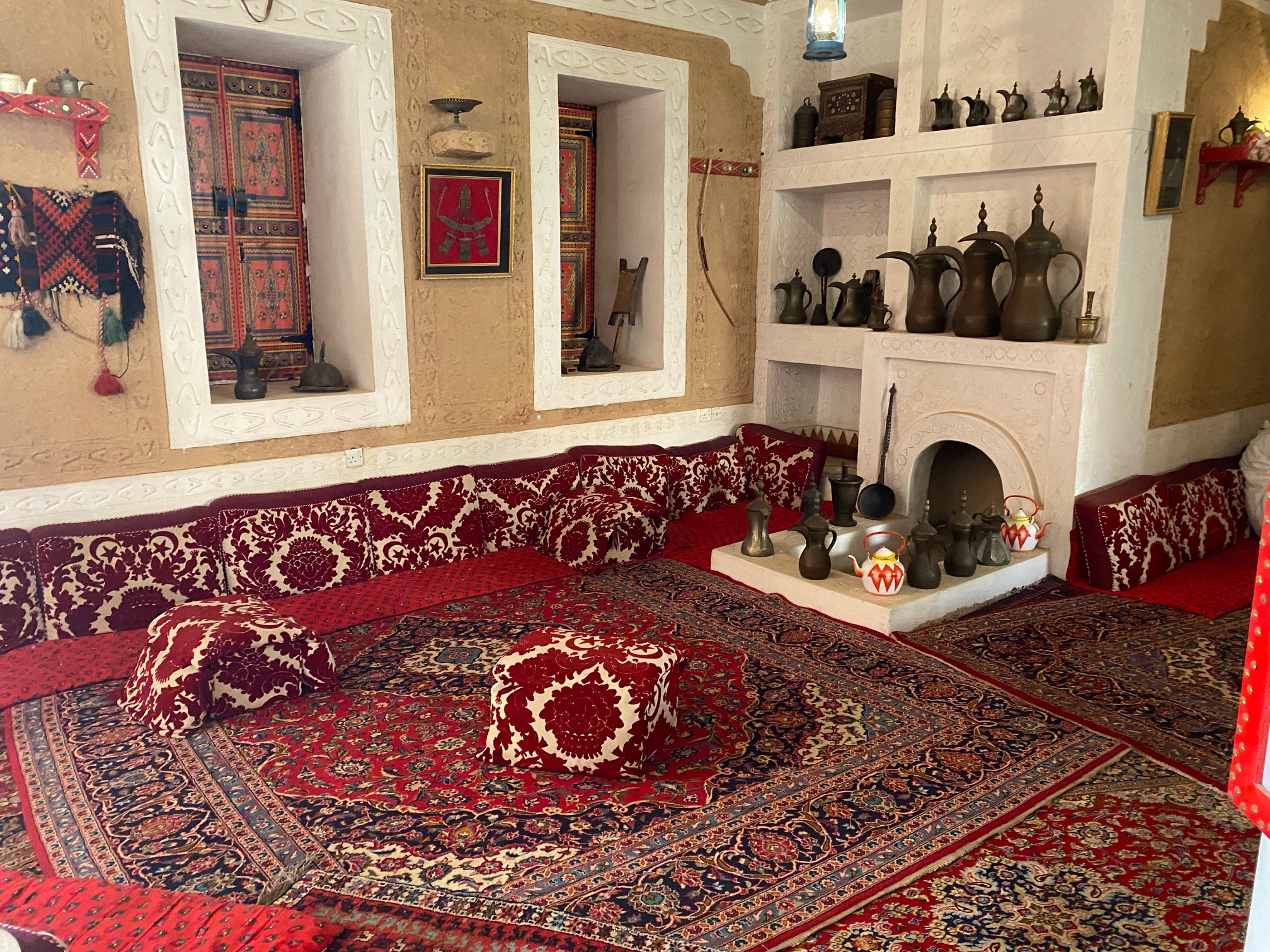
View from inside a traditionally styled restaurant in Riyadh
Our role as intercultural agents of change
As a guest and speaker at the Translation Forum 2022, I certainly was inspired by the upbeat atmosphere, and I hope I was able to provide some inspiration myself to the many people I met and who came to my sessions. The interest in transcreation is baffling.
I am also aware that I only got a glimpse of what is currently changing in the country, and that the pace can be overwhelming in some regards, while changes in other areas will still need time.
As agents of intercultural communication, translators in all fields can be ambassadors and promoters of these changes and initiatives, and I applaud the efforts to recognize the importance of our profession.
In this spirit, I am looking forward to joining forces with transcreators around the world, and to using our power to create a positive impact wherever we are.
Thank you to the Literature, Publishing & Translation Commission for organizing this multi-faceted intercultural event. Thank you for the warm hospitality and attentiveness that we were all given throughout the conference, and during an exclusively organized tour of the bustling city of Riyadh. Thank you for having me, and I sincerely hope to be able to come again.
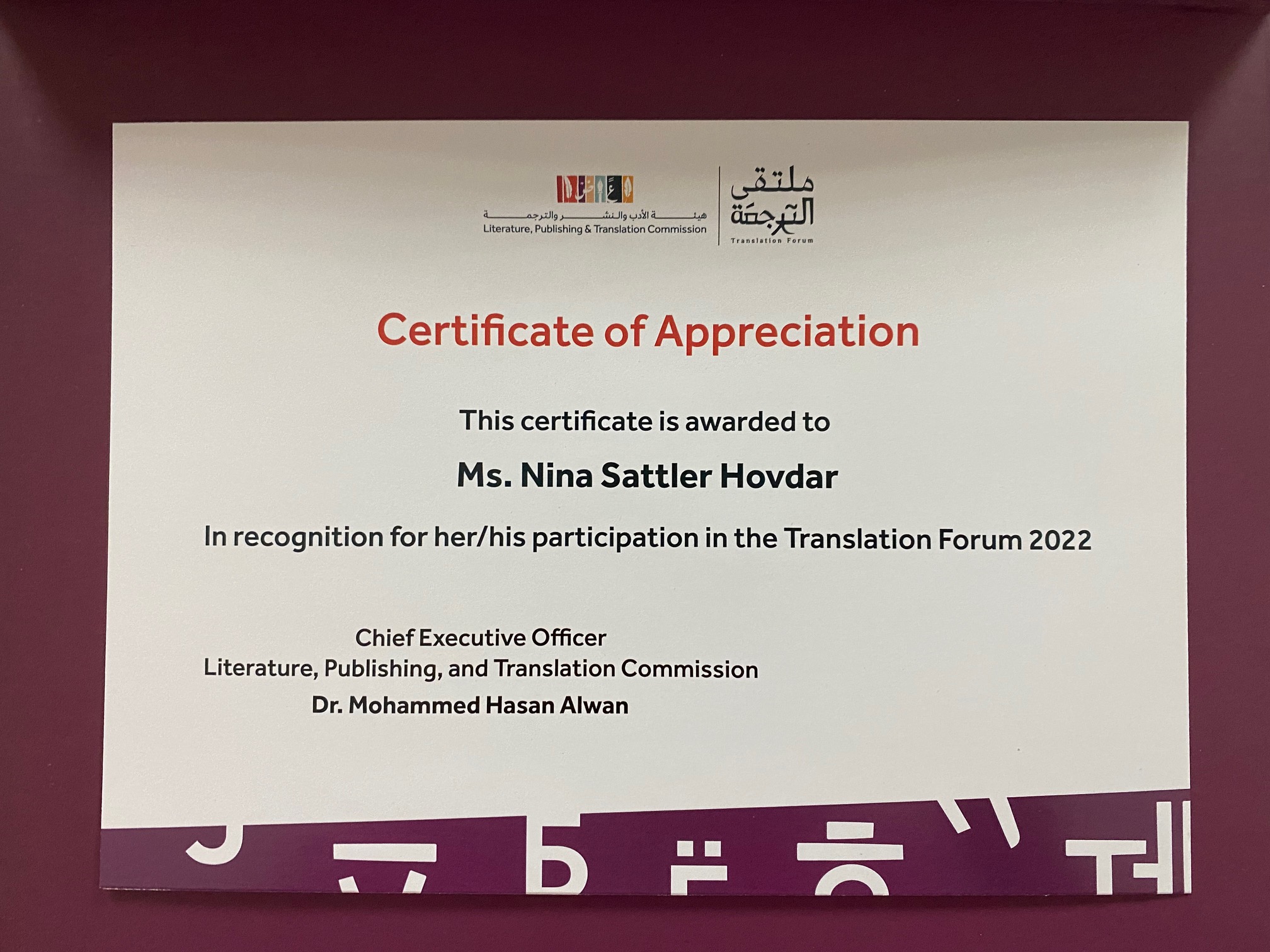
Certificate of Appreciation for my contributions to the Translation Forum
Here are some current links with more information on changes happening in Saudi Arabia, including its ambitious “Vision 2030”:
https://www.vision2030.gov.sa/
https://www.imf.org/en/News/Articles/2022/08/09/CF-Saudi-Arabia-to-grow-at-fastest-pace
https://www.greeninitiatives.gov.sa/
https://agsiw.org/saudi-arabias-abaya-signals-a-new-era-of-fashion-empowerment-and-cultural-pride/
